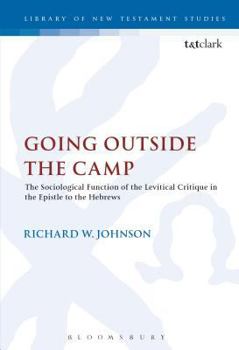Going Outside the Camp
Johnson's study of Hebrews is unusual in adopting a social-scientific analysis. By examining the implicit sociological data in the Epistle to the Hebrews, and locating the implied society within the context of the larger Graeco-Roman world, he concludes that the author of Hebrews advocates an ideal society that is both more open to outsiders and more willing to assimilate fully new members than was first-century ce hellenistic Judaism. According...
Format:Hardcover
Language:English
ISBN:1841271861
ISBN13:9781841271866
Release Date:March 2002
Publisher:Sheffield Academic Press
Length:177 Pages
Weight:0.86 lbs.
Dimensions:0.6" x 6.1" x 9.7"
Customer Reviews
0 rating





